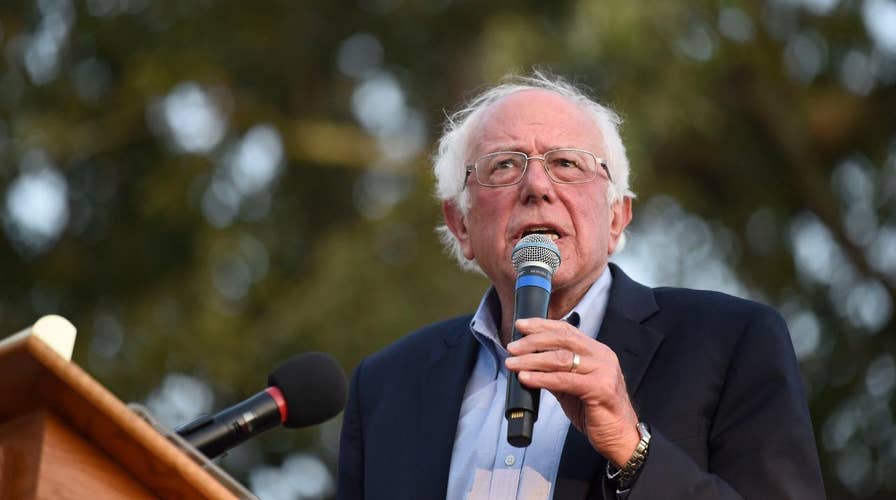2020 Democrat Bernie Sanders officially unveils his plan to wipe out $81 billion in medical debt
Dr. Marc Siegel weighs in on 2020 Democratic hopeful Sen. Bernie Sanders' health care plan.
Sen. Bernie Sanders on Tuesday unveiled a massive tax on the wealthiest Americans that aims to diminish income inequality -- a central theme of his campaign -- and at least begin to finance the steep price tags for the numerous government programs the Democratic presidential candidate is proposing.
The release of the independent senator from Vermont's ‘Tax on Extreme Wealth’ follows a similar plan from one of his top rivals for the 2020 Democratic nomination, fellow progressive and populist lawmaker Sen. Elizabeth Warren of Massachusetts.
“There should be no billionaires. We are going to tax their extreme wealth and invest in working people,” Sanders said on Twitter as he urged supporters to read his new plan. His campaign also sent an email under the subject line: "Billionaires should not exist."
THE LATEST FROM FOX NEWS ON THE 2020 PRESIDENTIAL CAMPAIGN
In his decades in Congress and during both of his runs for the White House, Sanders has railed against an American economic system that he says favors corporations and the rich, at the expense of the working class.
Sanders' plan, if enacted into law, would place a 1 percent tax on net worth over $32 million, a 2 percent tax on net worth between $50 million and $250 million, and a 3 percent tax on net worth between $250 million and $500 million. The proposed Sanders tax would increase to 4 percent net worth from $500 million to $1 billion, 5 percent for net worth from $1 billion to $2.5 billion, and ultimately reach 8 percent for wealth over $10 billion.
The Sanders campaign says their plan would impact approximately 180,000 households nationwide, and would raise about $4.35 trillion in government revenue by the 2028 budget year.
“Our tax on extreme wealth would only apply to the wealthiest households in America and would cut the wealth of billionaires in half over 15 years, which would substantially break up the concentration of wealth and power of this small, privileged class,” Sanders said in an email to supporters announcing his plan.
And he said that he would “use the revenue to fund our affordable housing plan, universal childcare, and help fund our work to guarantee health care as a right for every man, woman, and child in this country."
The Republican National Committee criticized Sanders, with spokesman Michael Joyce arguing that “no matter how many new taxes Bernie proposes, it still won’t come even close to covering the costs of Bernie’s socialist pie-in-the-sky policy proposals.”
Warren’s plan – which she unveiled at the beginning of the year-- by comparison would place a 2 percent annual tax on net worth above $50 million and would slap a 3 percent tax on net worth above $1 billion.
Her campaign says it would affect the top 70,000 households in the county and would bring in an estimated $2.6 trillion over 10 years.
The Sanders plan
- Affects about 180,000 households
- Would raise about $4.35 trillion in government revenue by the 2028 budget year
The Warren plan
- Affects the top 70,000 households
- Would bring in about $2.6 trillion over 10 years
Sanders, in order “ensure that the wealthy are not able to evade the tax,” is calling for creating a national registry and beefing up third-party reporting requirements, increasing funding for the Internal Revenue Service and requiring the IRS to perform audits of 30 percent of those in the 1 percent bracket and audits of all billionaires.
He’s also calling for a 40 percent exit tax on the net value of all assets under $1 billion and a steeper 60 percent on assets over $1 billion “for all wealthy individuals seeking to expatriate to avoid the tax.”
President Trump’s re-election campaign took aim at Sanders, not specifically over his new plan but for vows by the senator and the rest of the Democratic field to repeal the tax cuts passed in 2017 by the then-GOP controlled Congress and signed into law by the president.
“By repealing President Trump’s tax cuts, Sanders and the rest of the Democrats would raise taxes on almost all Americans, not just the very rich,” campaign spokesperson Erin Perrine said.





















